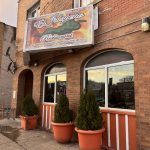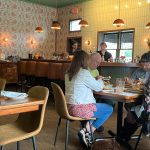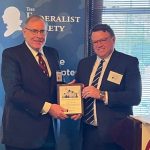Caroline E. Layde
May 4th, 2003 by Vital ArchivesADULT.
By Haven Langhout ADULT. is the real-life couple Nicola Kuperus and Adam Lee Miller and a variety of undisclosed electronic music gear. Anxiety Always is their second full-length EP, their first being 2001’s Resuscitation. Like its predecessor, Anxiety Always features more songs about alienation and anxiety, but this album has a more human touch to it. Perhaps it’s the addition of a bass guitar played by Adam Lee Miller. It’s not strictly computers and gear anymore. Or maybe it’s because Nicola Kuperus’ vocal style isn’t as deadpan and flat as in the past. She actually has an inflection when her voice isn’t being fed through some processor. In “Kick in the Shin” she sounds a bit wounded delivering the lines “kick in the shin, is that how you say I love you?” – a definite departure from her previously emotionless delivery on other ADULT. releases. ADULT. has a sense of humor. I’d like to think so with the lyrics on “Turn Your Back” where Kuperus taunts us “Could’ve been me, could’ve been you – neh neh neh, neh neh neh.” Or on the track “Shake Your Head” where Kuperus admonishes us to “ask your mother, the end of guessing games.” The stand-out track on this album is “Glue Your Eyelids Together”, a catchy tune with a nice dirty bass line and the chorus “glue your eyelids together!” There’s almost a manic punkish energy to it. I prefer Resuscitation because of its sparse, clinical quality, and it took me awhile to warm up to this album. Perhaps it’s because it gets a bit too “busy” in some tracks and Kuperus can sound shrill at times. But if you like this sort of music and keep in mind that ADULT. is being tongue in cheek, you’ll definitely enjoy this album, and it would make a fine addition to your collection.
May 1st, 2003 by Vital ArchivesAll Girl Summer Fun Band
By Greg Sampson For a time I thought it unfortunate for the girls of All Girl Summer Fun Band that I remembered their 2002 self-titled release mostly for its lukewarm reception by many critics. I remember hearing the album myself, and while I found their music catchy and even pleasant, my overall reaction could not be characterized as much more than, well, underwhelmed. It wasn’t long before I moved on to other bands who I thought were doing something more interesting and meaningful, whose music had more depth than the giggly, bubblegum punk that AGSFB were turning out. Remembering the arrogant conclusion I jumped to last year, AGSFB’s latest release, 2, really sounds like a straight-out ‘screw you’ to all the self-righteous critics who dismissed them as being too girly, too high-school, and their music too thin. In this album they’re still singing about the same crushes and make out sessions, and have even added some celebrity worship into the mix (get this: they wrote a song called – you know it – “Jason Lee.”). But in this album they sound surer of themselves, more like they know that yes, this is in fact the music they want to be making, and these are the things they want to be singing about. They don’t care what I, or any other critic for that matter, thinks. Good for them. The subtle bad attitude they exude seems to work for AGSFB on this album, and it makes 2 compelling and listenable. Only the truly heartless wouldn’t find a song like “Samantha Secret Agent” so catchy that it didn’t merit a second listening. By staying on the same road on which they started with their first album, they seem to have created a sense of progression with this release, which is a good thing. But now that they’ve shown they aren’t going to change for the critics, the big question is whether AGSFB will change for themselves. As we all know, the novelty of a band and the catchiness of its music is a fleeting thing, and audiences are notoriously fickle when that’s all there is to hang on to. So they will have to change, or they will disappear. The good news? All Girl Summer Fun Band is more than attitude, catchiness, and late-teens/early-twenties romanticism. Something might be happening in 2, just below the rigid adherence to their undergraduate ways. I wouldn’t be surprised if we saw some real growth in their music in the future.
May 1st, 2003 by Vital ArchivesMarc Broussard
By Brian Barney Marc Broussard first hit the stage at age five, joining his father, Hall of Fame guitarist Ted Broussard to belt out “Johnnie B. Goode.” Fifteen years later, he has become one of the brightest young talents to ever cause a record company bidding war. His legacy goes back to his grandfather, Albert, and influences within his family (most of whom are musicians) include primo Motown and classic jazz fusion. His debut release, Momentary Setback, is an eight-song collection of introspective, soulful songs that belie his young years. Broussard is the male answer to Nora Jones. His music is where Otis Redding meets Leo Kottke in a style that, with its depth, and the nature of his over-the-top songwriting and vocal prowess, is hard to pigeonhole. The opening track, “The Wanderer,” sets the tone with rich vocal lines that flirt with pop sensibilities bordering on mainstream. A Stevie Wonder funkiness resides in “Blue Jeans”, and the closing number, “Jeremiah’s Prayer,” steals the show with a happy/sad melancholy. Throughout the disc, stunning musicianship shines with drummer Mike Birch’s mastery of dynamics, David Ransons’ fluid bass lines, perfect placement by Shawn Carter on piano, and the drenching Hammond B3 organ of David Egan. The only problem with the disc is that it’s too short. Hopefully, due recognition will take place, and a major deal will see to it that Broussard’s vision doesn’t fade.
May 1st, 2003 by Vital ArchivesCan we teach Iraq to live (and love) democracy?
By Paul McLeary Democracy, being the big, wonderful, scary beast of a political system that it is, can please some of the people some of the time, but not all of the people all of the time. For all the lip service paid to its’ being beholden to the will of the people, a democratic system can also have wildly unexpected consequences – Hitler was a democratically elected leader, after all. Likewise, now that Iraq has been liberated and we’re gearing up to install democratic institutions in that repressed country, things may not be as rosy as some pundits make it seem. What if they elect someone we don’t like? Try this on for size: What do you think would happen if the first free elections in Iraq produced a victory for a nationalist or anti-western Islamic party like the one that currently rules Iran? Would we let the people choose a regime antagonistic to a western presence in the region? It’s a tough question, and one I hope the Bush administration has war-gamed, though staying true to form, they haven’t addressed the issue in public as of yet. The fact of the matter is that if Osama bin Laden were on the ballot in Saudi Arabia, Yemen, Afghanistan, Pakistan or any number of middle eastern countries, he’d likely win in a landslide. Signs of fierce Islamic nationalism have already begun to show up. On Friday, April 18th, only days after Baghdad fell, tens of thousands of residents took to the streets of the capital city to demand coalition withdrawal from the country and the establishment of an Islamic state. The demonstrators carried signs reading “No Bush, No Saddam, Yes to Islam,” and “No to America, No to Secular State, Yes to Islamic State.” Led by a group calling itself the Iraqi National United Front, the protesters represented a facet of Iraqi life –Islamic fundamentalism – that hasn’t been discussed much in the American media. Although full of unrealistic bluster (one man said if the Americans weren’t out in a few months, Iraqis would “kill them with our knives”), history has shown that there’s nothing more dangerous than a cornered dog. A democratic Iraq: the ultimate “square one” While democratic institutions may seem easy enough to create and maintain from our extremely fortunate perspective, certain preconditions normally need to be met before a real democracy can take hold – preconditions which are, at present, not only completely absent from Iraqi society, but Middle Eastern society in general. In the administration’s favorite examples of successful democratic nation-building, post-war Japan and Germany, conditions were far different than in Iraq. Both countries had a large, educated and entrepreneurial middle class, high literacy rates, an existing industrial base, familiarity with western political traditions and political history, remnants of a free press and a largely secular society familiar with the rapid political and economic changes of the 20th century. In contrast, Iraq has virtually no educated middle class from which to draw upon to begin […]
May 1st, 2003 by Vital ArchivesThoroughly Modernist Museum
By Ken Morgan It’s already been selected to receive a 2002 American Architecture Award from the Chicago Athenaeum Museum of Architecture and Design. The Racine Art Museum opens its doors for the first time on May 11, 2003. A terrific example of contemporary architecture, it takes its place in Racine alongside 20th century architectural design landmarks such as Frank Lloyd Wright’s masterpiece “Wingspread” and the S.C. Johnson & Son, Inc. Administration Building and Research Tower. Chicago architects Brininstool + Lynch conceived the new museum building as a “restrained, modern showcase for one of the nation’s foremost collections of contemporary crafts.” The project included the total redesign of an existing building that had been a composite structure of different buildings from various periods, parts of which dated back to the Civil War. To give the building a unified character, Brininstool + Lynch devised what has become the project’s defining feature: a continuous wrapper of translucent acrylic panels. “At night, when the panels are lit from behind,” observes Bruce Pepich, Executive Director and Curator of Collections at RAM, “the museum glows like a lantern, serving as a beacon in downtown Racine.” WOOD RAM will house exhibition spaces for its permanent collection (which will be rotated on a regular, frequent basis to give museum-goers a chance to see as much of it as possible) and temporary, traveling shows, plus a museum store “curated” itself with consideration and flair. An entire floor will be dedicated to the collection, care and preparation of art, an extensive art library and research center, and administrative offices. Outdoor sculpture will be prominently displayed in a courtyard with views to Lake Michigan: this space will be open to the public and will also be used for special events. RAM will continue to play a vital role in arts education through its Charles A. Wustum Museum of Fine Arts campus, a short drive from the museum, where community outreach programs and studio art workshops are taught by nationally known artists. METAL The inaugural exhibition, Introducing RAM: The Building and Collections, will feature more than 150 works of contemporary crafts, many of which will be seen for the first time in the new Karen Johnson Boyd Galleries. Introducing RAM will highlight representative works from the more than 1,600 examples in the museum’s permanent collection. This extraordinary collection has been curated over the past 12 years through gifts from collectors and artists from across the country. “We were extremely fortunate to begin with the gift of a 200-piece collection of ceramics, baskets, and jewelry contributed by collector Karen Johnson Boyd in 1991,” elaborates Pepich. GLASS The show will include works by such prominent leaders in contemporary crafts as ceramists Peter Voulkos, Jack Earl, Kenneth Ferguson, and Richard Shaw; fiber artists John McQueen, Lillian Elliott, Joan Livingstone and Dona Look; sculptors in glass Dan Dailey, Richard Marquis, Joel Philip Myers, and Ginny Ruffner; jewelers Robert W. Ebendorf, Arline Fisch, Harold O’Connor, and Earl Pardon; and wood turners and furniture artists Wendell Castle, Jere […]
May 1st, 2003 by Vital ArchivesThe "External Evil Winds" of Spring
By Lygia Angel Treating allergies with Traditional Chinese Medicine A strong wind blows over a field of ragweed. Suddenly, you sneeze and your eyes start to itch. In Chinese medicine this “sudden onset” (a.k.a., acute allergic reaction) means an “External Wind Evil” has attacked your lungs. When environmental or seasonal allergens are present, the body is hit by an allergen filled “wind.” To ward them off, Chinese medicine first strengthens the lungs and the exterior of the body. When you strengthen the lung energy sufficiently, that strong gust of ragweed blowing past your nose will pass through your system with no unpleasant physical effects. If the lungs are not strong enough, the result is sneezing, accumulated phlegm and nasal discharge. You could run for a prescription or over the counter medication, but this only masks your symptoms. For a true cure, the underlying conditions within the body must be addressed and brought into balance. Lung Qi, Defender From Allergies In traditional Chinese medicine the lungs are the most superficial organs, meaning they are the closest internal organs to the outside of your body. They act as the body’s defender from “external evils,” and are the first affected organs in allergic reactions. The job of the lungs is to down-bear air and excess fluids through the body and moisten (diffuse) the skin. The lungs moisten the skin by sending fluids to the skin and opening and closing the pores with their energy. This is called the defense qi. Defense qi is the natural energy of the lungs, which protects the surface of the body. One benefit of strong Defense qi is the ability of the pores to close when the body is cold (protecting it from external pathogens) and open when hot to sweat (eliminating excess heat or disease). For example, a healthy person with good Defense qi has pores that close when needed, and can tolerate cold wind better than a person who is weak, as if he literally has tough skin. This ability to block unwanted pathogens from entering the body also applies to allergens. When your body is hit by wind-blown pollen, strong lung qi should be able to pass what has entered the nose through your system and seal it from entering the skin. So the first treatment for allergies in Chinese medicine is to strengthen the lungs. This helps prevent an allergic reaction to airborne pathogens. One way to strengthen lung energy is with acupuncture points. These points are not necessarily near the lungs. In fact most points that strengthen lung energy are on or near your wrist. Another method for building up lung energy is herbal decoctions. Chinese herbal decoctions or remedies contain nutritive properties, as well as energies specific to particular conditions. In Chinese herbal medicine, different herbs are appropriate for different organs, and so the herbal decoctions for the lungs contain specific nutrition for the lungs as well as vibrations of energy. A Strong Army of Organs:protectors of the Lungs In Chinese medicine, […]
May 1st, 2003 by Vital ArchivesDr. Judy Hall’s mission of medicine for the Iraqi people
By John Hughes On a recent unseasonably warm Monday evening, I sat with Judy Hall on the front stoop outside of her home, and as the breezes cooled us we watched neighbor children ride bicycles up and down the city street. Judy, an M.D. and psychiatrist, told me about her recent 10 day visit to Baghdad, Iraq, on a mission to teach Iraqi physicians. “I’m not really an activist,” she says. “My interest in Iraq began in medical school days when an Iraqi woman was my supervising resident. I’ve been thinking about her and worrying for all the ensuing years. So, in 1991, I was actually hopeful about the sanctions, when they were imposed, because I thought that might be a diplomatic solution to the Hussein problem. But in the end those sanctions were worse than any war could have been, for the suffering they’ve inflicted on the Iraqi people, without bothering Hussein at all.” “I was actually hopeful about the sanctions… But in the end those sanctions were worse than any war could have been, for the suffering they’ve inflicted on the Iraqi people, without bothering Hussein at all.” Her blonde hair falls in her eyes, over her steel framed eyeglasses, dancing in the breeze. She is, I estimate, roughly 50 years old, relaxed and unpretentious, the highlight of her clothing being her bright red clogs. She speaks freely. “In 1996, I became aware of a group called Voices in the Wilderness, who were bringing suitcases of antibiotics into Iraq. With the poverty inflicted by the U.S. sanctions, the water system was going bad, and people were getting sick. I thought these deliveries were good, but I also thought it would be more effective to clean the water system. So, although I supported Voices, I looked for a different group to be involved with. “Now realize, it was illegal to help the Iraqi people like that, or in any way, against the sanctions, without a license from the State Department. And the penalty for doing so is 12 years in prison and a $1.25 million fine.” I ask Judy how a person might go about giving a license. “In reality, they don’t give licenses,” she says, and laughs. “Finally, I was called on the carpet, though. I heard about something called ‘Campaign for Conscience’, which was the American Friends Service Committee, working in conjunction with Pax Christi and the Fellowship of Reconciliation. And they were importing small chlorinators so that they could at least purify the water for hospitals and orphanages, and perhaps some villages.” She then described to me a “Quaker Summit on Iraq” which she attended in January of 2002. During this event she learned of greatly increased incidences of birth defects and childhood cancer since Desert Storm, attributed to the depleted uranium casings left after the fighting 11 years before. She learned that Iraqi physicians had inadequate medication to deal with this endemic situation. She also learned that the U.S. sanctions apply to a ban on […]
May 1st, 2003 by Vital ArchivesBorrower Beware
By Bethany Sanchez PART ONE OF A TWO-PART SERIES A cautionary tale “Mrs. Green” is a 72-year-old widow, who has lived in her home for 28 years. When a home repair contractor knocked on her door in April 2000, Mrs. Green had great credit, and she had almost paid off her entire 30-year mortgage. The contractor told her that it looked like her house needed some work. Mrs. Green acknowledged that her roof leaked, the house needed painting, and that the front porch was deteriorating and unsafe. However, she told the contractor that she could not afford to make the needed repairs, as she was on a very limited, fixed income. The contractor told Mrs. Green about a lender who would give her a home repair loan. The lender came to Mrs. Green’s house, helped her with her paperwork, and then sent out an appraiser who valued her house at a surprisingly high amount. The lender gave her a loan that not only paid the cost of the repairs, but also refinanced Mrs. Green’s mortgage and consolidated her credit card debt. The new interest rate was twice that of the old mortgage. Mrs. Green paid almost $5,000 in fees on the new loan and doubled her monthly debt payment. Shortly after the loan closed, Mrs. Green’s brother-in-law died. She used some of her monthly income, and tapped into her very limited savings to travel to New York to help her sister with the funeral and burial expenses. These expenses stretched her resources and caused her to, for the first time ever, send in her loan payment late. When the next month’s statement arrived, Mrs. Green found that she had been assessed a huge late payment fee, and when she did not pay the fee, the amount considered to be overdue continued to increase until the lender threatened to foreclose on the property. Not having many options, Mrs. Green decided to sell her house and move in with her son, but she found that the loan amount was $20,000 more than the market value of the house. The appraisal had been falsified. Mrs. Green was trapped in a loan that she couldn’t pay, and couldn’t even sell her house to entirely pay off the loan. She had no way “out.” “Mrs. Green’s” story is only one of hundreds involving Milwaukee area homeowners who have become victims of what is called a predatory loan. The details of these stories and loans vary widely from homeowner to homeowner, but the despicable practices of predatory lenders usually take a devastating toll on the homeowner. What is a predatory loan? A predatory loan is a loan that is unsuitable for the borrower, designed to exploit vulnerable or unsophisticated borrowers. A predatory loan has one or more of the following features: Mrs. Green’s story actually combines several of the things the Metropolitan Milwaukee Fair Housing Council hears over and over. The most common reasons people are seduced by these loans are an urgent need for cash […]
May 1st, 2003 by Vital ArchivesPrivate Thoughts of War
By John Hughes One of the many stories of the Iraqi War and Reconstruction is the personal thoughts and feelings of rank and file Milwaukeeans. Beyond poll numbers, beyond anti-war demonstrations and radio talk shows, beyond politicians, pundits and headline grabbers, there are the common woman and man. In a series of five interviews with Milwaukeeans of both genders, from different neighborhoods in the city, Vital Source spent time with some of your neighbors, who shared their thinking on this war and its widespread implications. We asked them why the United States went to war. We asked whether or not the consequences of not taking action are worse than the bloodshed and death that continue after weeks of fighting. The interviewees shared their hopes and fears for the outcome of the war. They were asked their opinions on military intervention in North Korea, which, like Iraq (until weeks ago), has a murdering despot at the helm and, far more demonstrably than Iraq, possesses weapons of mass destruction. Finally, we asked the two women and three men what should and would happen if, once democracy is established in Iraq, the citizens there were to freely vote to cut off the supply of oil to the United States. The people in question were thoughtful. A query would be posed and, almost universally, a reflective pause would follow before an answer was given. Each appeared to be nurturing the question, thinking his or her way through. They were all well informed, and had been following the news on television and radio, in the press, and on the Internet. They weighed the pros and cons of the war with gravity. At times, even their stated position (for or against the war) could not be easily delineated once in conversation on the subject. And even those whose viewpoints came out at the same place arrived there by very different paths. In all, our conversations with these “average Milwaukeeans” reflects the complexity of millions of conversations on the subject of war and its aftermath heard daily in our city and around the country. Five people, five perspectives. An East Side woman, Katherine, who professed to viewing spirituality from an Eastern perspective, who spoke of “karmic loops” and quoted Sartre, called President Bush “an idiot” and then came down squarely on the fence with regards to endorsing or opposing U.S. actions in Iraq. She called herself “a hybrid hawk and dove.” Dan, a Milwaukee man living a stone’s throw from the West Allis border in a traditional blue-collar neighborhood, was opposed. Dean from St. Francis was also opposed. Terry, from Racine, spoke at length and with fervor using language that made me refer to him as “pro-war.” He became quiet at that moment and said, “Sometimes war is a necessary evil, but it is always evil. I prayed every day that the war would not happen, that a diplomatic solution would be found. But when the war began, I prayed for victory.” Mary from Glendale was articulate […]
May 1st, 2003 by Vital ArchivesA Poet’s Journal
By Russ Bickerstaff 04-09-03 The Bucks just won a game which brought them within one game of the playoffs. I don’t care. I’m wondering what happened to all the poets. I’m at the Y-Not II on the second Wednesday of the month and there are less than six of us there for the East-Side Milwaukee Poetry Slam. When had Milwaukee’s oldest poetry slam become such a secret? The whole scene on the east side has seemed pretty inactive in the past couple of years. In the past seven years, I’ve seen attendance at poetry venues on the East Side run a strange parabolic wave. There are high points that mirror this low: I remember the summers of ‘98 and ‘99 when there were four or five open mics every week and no one made it to them all. Now things are scarce. The Y-Not II is a long corridor of a bar with an elevated stage in back. There’s a podium there with a microphone that amplifies the voice throughout the room. Geo Kiesow shows up early to turn on the stage lights and the sound system. Geo’s been hosting the Y-Not II poetry slam for years. Fresh from a fishing trip, he does a piece from years ago that he wrote about fishing with his dad on Lake Poygan. It’s a very conversational piece that wraps the mind in the feel of northern Wisconsin. This is Geo’s literary home: the poetry of genuine rural life – not the romanticized visions typically found in nature poetry. The words feed through the speakers and Geo’s out there on Lake Poygan fishing in his childhood. I nearly drowned in that lake the day after my high school graduation. Geo and I were born in the same hospital down the road from the foundry in Neenah, Wisconsin. In spite of this, we come from very different places. The co-host for the evening is Tim Grair. He’s doing cover pieces: the poetry of Patricia Smith (no, not Patti Smith – Patricia). I’ve heard him do pieces of his own stuff. It’s a very diverse body of work. He’s covered everything from the fashion industry with his “Max Factor Massacre,” to the intricacies of growing-up with “Sex, Drugs and Rock and Roll at 11.” He’s not performing his own stuff tonight. Maybe he’s just not feeling it. Or maybe there just aren’t enough people here tonight. Years ago the Y-Not II poetry slam was much better attended. We don’t have enough people performing for the night to hold the slam competition, so the evening ends with only an open mic. Long-time East-side poet JoAnn Chang tells me that there’s a big poetry performance at the Mecca’s poetry slam on the west side Thursday night. Slam competition teams from another state are coming in to perform with national slam poets from Milwaukee. I can’t make it. I’ve got my own poetry venue to host that night. 04-10-03 I’m brooding pleasantly over a cup of coffee at […]
May 1st, 2003 by Vital ArchivesMay 2003
By Jon Anne Willow Dear Readers, It’s been a month of highs and lows, a state of being which seems to be going around. Science buffs may recall here the first law of thermodynamics, which states that energy under normal conditions cannot be created or destroyed, but simply transformed from one type of energy to another. Sounds kind of astral to apply physics to events and feelings, maybe, but I’ve never seen a reason why such a sound law wouldn’t apply across the board. So, while I’ve got lots to be thankful for in terms of Vital’s progress this month, we’ve also felt the stresses that always accompany troubled times, when people aren’t feeling quite themselves, are worried about the future, and feel cut off from the sense of surety that generally accompanies life in America. On the other hand, applying the above law, maybe there’s hope in loss of complacency. But anyway, enough of that. We’d like to thank everyone who came out for our first birthday party at Onopa (see pictures below, or visit our web site for a full gallery). The bands were amazing, the food delicious, and the party-goers looked beautiful. As the song goes “Everybody had a good time.” We raised a good piece of change for 91.7 WMSE, to which all proceeds from the night were given. We also gave away a trip for two to Las Vegas from Funjet vacations and lots of other prizes from our local sponsors. We’ll see you again next year. At long last our web site is up and running. Check us out at vitalsourcemag.com. In the coming weeks, in addition to reading, printing and sending your friends articles and features from Vital Source magazine, you’ll be able to write your own book, film, theater and music reviews, rant in 50 Words, give us Your 2 Cents, sign up for our email list and much more. Check back often, as we’ll also update Vital’s Picks throughout the month. This month’s cover story is from Andrew Hollis, a former paperboy and petty larcenist. Confessions of an Old Paperboy will bring back memories of youth, even if you never experienced news carrier life yourself. We The People explores whether it’s realistic to “teach” a love of democracy to an ancient theocratic society. Today, Iraq. Tomorrow, the world? We continue to hone Vital Culture, and our commitment to covering the arts community beyond their events schedule. You’ll find more ink dedicated to the important outreach work our arts groups do throughout the year, as well as season announcements, employment openings, auditions and more. We hope you like it. Peace, Jon Anne
May 1st, 2003 by Jon Anne Willow


















